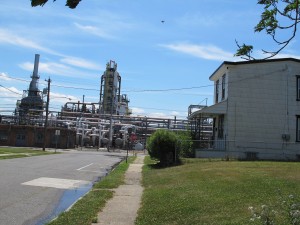Marcellus Shale Boom Could Breathe New Life into Idled Refinery

Susan Phillips / StateImpact Pennsylvania
The Sunoco refinery in Marcus Hook closed its doors for good in April. But town and county officials want to lure Marcellus Shale gas processing to the site.
The Sunoco refinery in Marcus Hook, near Pennsylvania’s border with Delaware, could be revived as a natural gas processing plant.
That’s the conclusion of a 127-page report released Wednesday by the energy analysis firm IHS. Delaware County officials commissioned the study, which details seven reuse options for the 781-acre site on the banks of the Delaware River in southeast Delaware County. Sunoco shut its doors this spring, after having already laid off about 400 full-time workers. All of the study’s reuse options for the plant are connected to the state’s Marcellus Shale drilling boom.
“We wouldn’t have been talking about this three years ago,” said IHS analyst Anthony Palmer. In other words, without shale gas, his report would be pretty short.
Among the seven potential reuses are an ethane cracker, a natural gas liquids processing plant, and a liquified natural gas export facility. The report lists several advantages for the site, including existing infrastructure, a dock that can accommodate a tanker, and onsite storage capacity. One of the disadvantages listed in the report is that the Delaware River is only dredged to 40 feet, unlike the New York harbor, which has a depth of 45 feet and can handle larger ocean-going vessels. Another is the lack of a “greenbelt.” The town of Marcus Hook sits right next to the refinery.
Governor Corbett recently lured Shell Oil to build an ethane cracker in the southwestern part of the state. But Palmer says the Northeast part of the country could handle two new ethane crackers. Ethane gets turned into ethylene for use by the chemical industry.
“We’re watching about 10 million tons of ethylene capacity announced or being considered in North America right now,” said Palmer. He says North America needs eight new ethane crackers to handle that amount of ethylene, a liquid byproduct of natural gas.
So why would it make sense to put a cracker in Southeast Pennsylvania? Plastics. That’s one of the driving forces behind the production of “wet gas.” Palmer says there’s a large market in the Northeast for the raw materials that make plastics. Right now, much of that raw material, or “feedstock,” gets shipped up to the Mid-Atlantic from the Gulf coast.
















